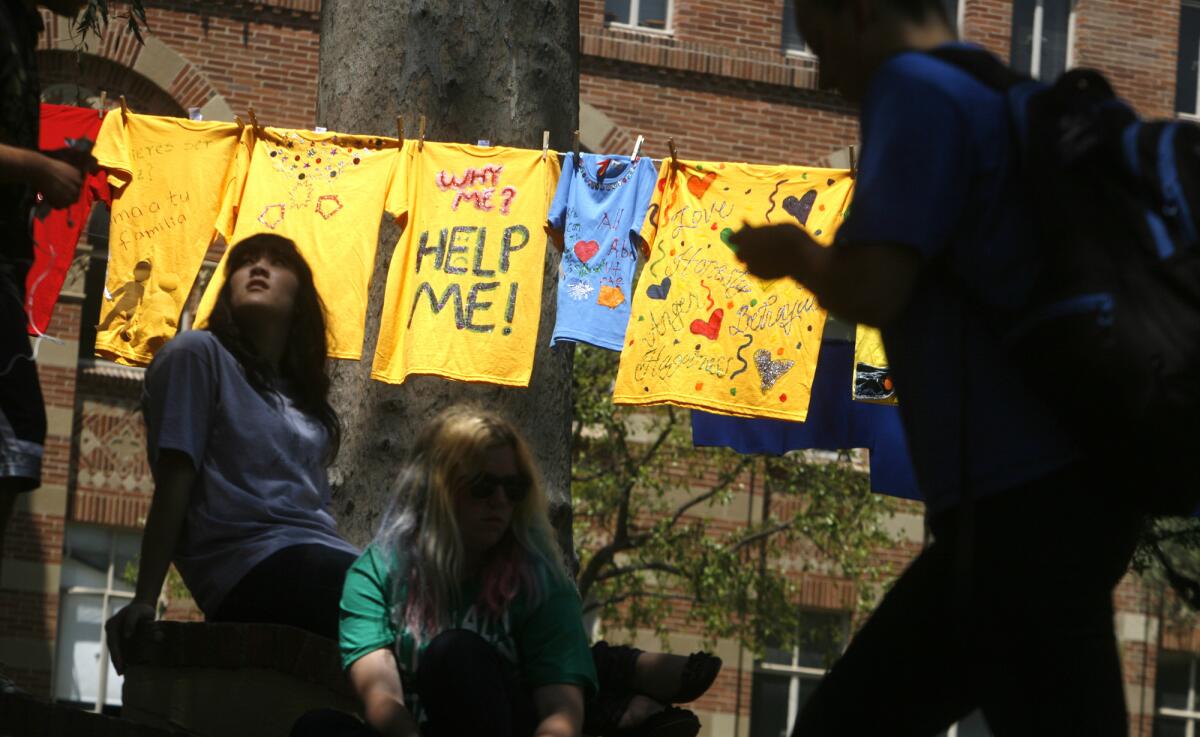British law expands definition of domestic abuse to include psychological harm

In the Clothesline Project at UCLA, survivors of domestic violence make yellow shirts to raise awareness of gender violence. Courtney Kiehl, left, sits near the line of shirts as other students pass by the display in 2011.
- Share via
reporting from London — A new law in Britain has expanded the meaning of domestic abuse by including emotional or psychological harm that falls short of threats of physical violence.
Under the “coercive control” statute, people who spy on their partners or family members online or attempt to control them via social media can now face up to five years in prison.
Until now, police in Britain were able to arrest someone for domestic abuse only if the victim was assaulted or threatened with violence.
The legislation, passed last week as part of a package of criminal justice reforms, was a victory for domestic violence campaigners. But the law will also present a challenge to prosecutors, who must prove repeated “controlling or coercive” behavior.
See more of our top stories on Facebook >>
The new law “demands much fuller understanding of events that led up to a call for assistance, and this can make evidence gathering more complex,” David Tucker, a senior national police official, said in a written statement.
A victim must have a credible fear of physical violence on at least two occasions, or the abusive behavior must have a “substantial adverse effect” on the victim’s day-to-day activities.
Domestic abuse investigators will receive specialized training, he said.
Charlotte Kneer, who manages a shelter for abused women, called the new law “amazing.”
But she also acknowledged that prosecutions could be difficult given how subtle the early warning signs of domestic violence can be. Her own experience more than two decades ago is a case in point.
Her partner moved into her home just a few weeks after their relationship began. Then he told her they should never go out separately.
He later persuaded her that couples in healthy relationships had to have sex every other day.
“Early on I wanted to please him,” she said. “I had fallen in love with him and I thought maybe he was right.”
Within six months, the controlling behavior turned physically violent.
Now 45, Kneer said the new law is about more than prosecutions.
“I think it’s important that people are talking about this,” she said. “I hope people will gain an understanding of what domestic abuse is, because it isn’t just the physical violence. It’s a much more complicated picture.
“This isn’t a minor form of abuse,” she said. “Coercive control is what domestic violence is, and that’s what people don’t understand.”
With the Internet and social media now pervading virtually every aspect of daily life, those who work with victims of domestic violence say nearly every case involves some form of online abuse.
A perpetrator might install GPS applications on a tablet or phone to track a partner’s movements, or demand access to passwords so online activity could be monitored.
Some abusers exert control by preventing partners from accessing finances and online banking.
Social media can also be used to isolate victims from their friends and family, making it harder to reach out for help.
One national charity, Citizens Advice, which assists more than 5,000 people a year, said more than half of its clients who experienced physical harm were also victims of emotional abuse. About a sixth reported financial abuse.
In a written statement, Alison Saunders, a top prosecutor, praised the new law.
“Being subjected to repeated humiliation, intimidation or subordination can be as harmful as physical abuse, with many victims stating that trauma from psychological abuse had a more lasting impact than physical abuse,” she said.
Boyle is a special correspondent.
ALSO
Kuwait recalls ambassador to Tehran amid Saudi-Iran tension
How Oregon ranchers unwittingly sparked an armed standoff
Chargers, Raiders and Rams submit relocation applications to NFL; now for the hard part
More to Read
Sign up for Essential California
The most important California stories and recommendations in your inbox every morning.
You may occasionally receive promotional content from the Los Angeles Times.










